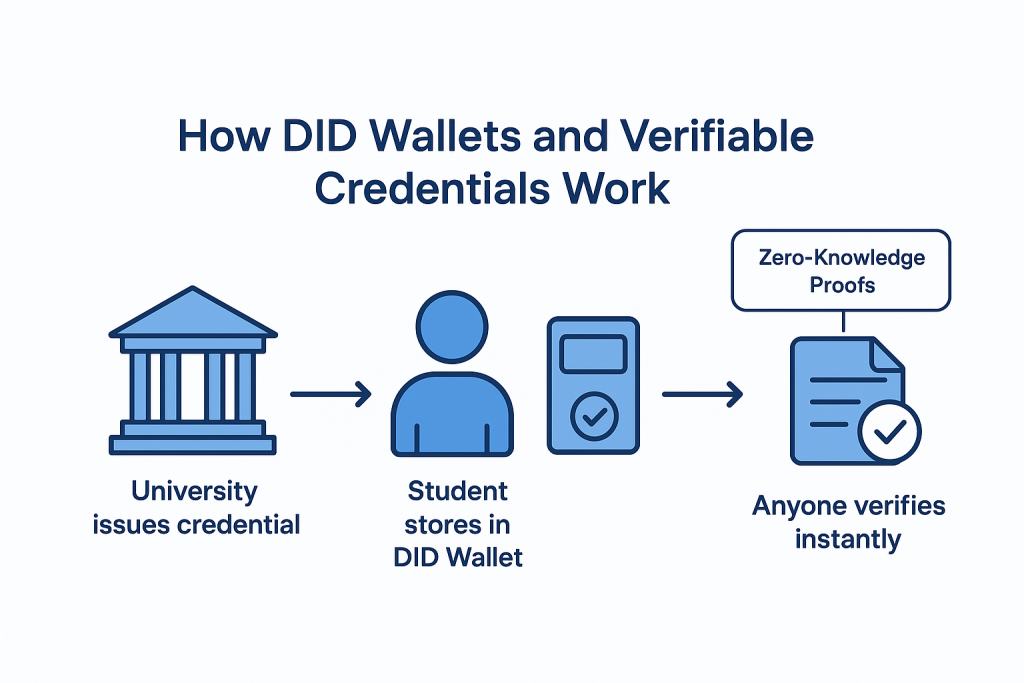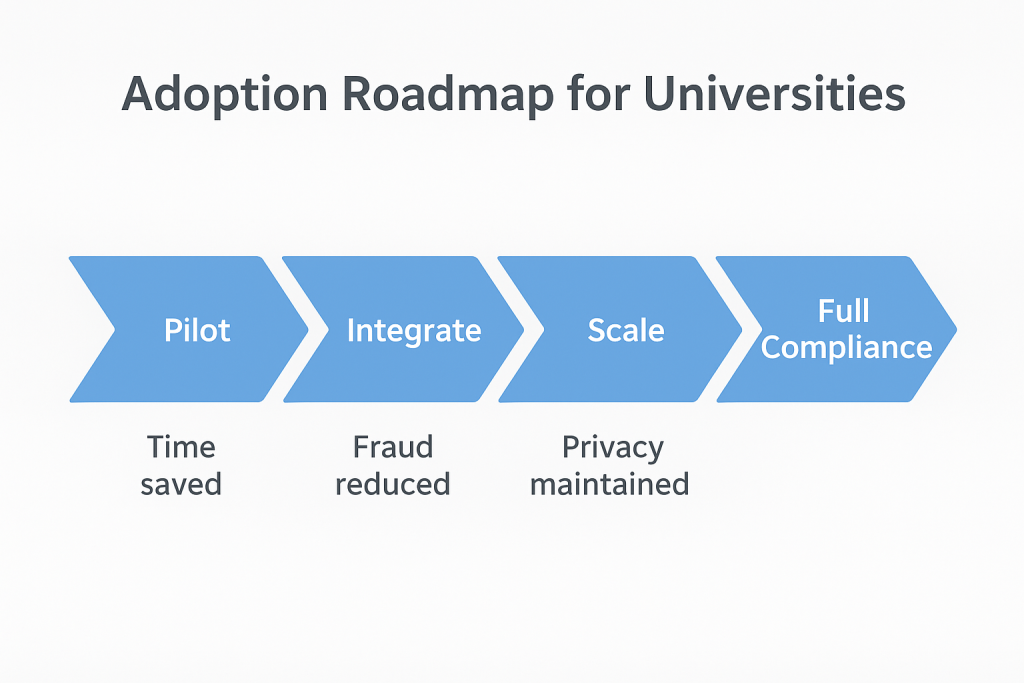Italian LMS platforms issue millions of digital certificates every year. Students need to prove their degrees, transcripts, and badges quickly. But most of these records cannot be verified instantly. They often rely on slow, manual checks. This creates delays, risks, and frustration for both students and institutions.
In 2024, the Italian EdTech market is valued at USD 5.8 billion and continues to grow rapidly. Digital adoption in education is rising, and universities face increasing pressure to modernize systems.
At the same time, Europe is pushing for digital identity. The EU Digital Identity Wallet and eIDAS 2.0 regulation aim to give citizens a secure way to prove who they are and what they have achieved. Education will be one of the first areas to feel this shift.
This change puts pressure on universities and LMS vendors in Italy. They must prepare for new rules and higher expectations. Decentralized Identity (DID) Wallets and Verifiable Credentials offer a future-proof way forward. The question is simple: are Italian LMS platforms ready?
Italian LMS Platforms: Strengths and Gaps
Most universities in Italy use one of three learning platforms: Moodle Italy, Docebo, or OpenLMS. These systems support online courses, exams, and digital learning at scale. They are well known and widely trusted in both public and private institutions.
Moodle Italy is popular because it is open-source and flexible. Universities can customize it to fit their needs. But it often lacks built-in tools for secure identity and credential verification.
Docebo is strong in enterprise training and compliance. It offers modern features and smooth user experiences. Still, it relies on closed integrations, which makes it harder to connect with external digital identity systems.
OpenLMS is based on Moodle but designed for large-scale use. It helps universities deliver consistent learning experiences. Yet, its identity features are still tied to old-style logins and passwords.
Across all three platforms, the gap is clear. They manage learning well but fall short on identity and credentialing. None of them have a native way to issue or verify digital credentials in real time. This is where DID Wallets and Verifiable Credentials become important.
Why DID Wallets and Zero-Knowledge Matter

A DID Wallet works like a secure digital identity app. Students, teachers, and staff can store their verified records inside it. They control what to share and with whom. No central authority can misuse their data.
Verifiable Credentials are tamper-proof digital documents. A university can issue a degree or transcript as a credential. The student adds it to their DID Wallet. Anyone can verify it instantly without calling the university.
Zero-Knowledge Proofs (ZKPs) make this even stronger. With ZKPs, a student can prove they hold a valid degree without showing all the details. This protects privacy while still proving trust.
For CIOs and LMS vendors, these tools solve three big problems:
- They reduce fraud by making records impossible to fake.
- They simplify compliance with GDPR and upcoming EU rules.
- They save time by cutting manual checks and paperwork.
This shift is not just technical. It changes how universities build trust with students, employers, and regulators. DID Wallets and Verifiable Credentials give institutions a way to stay ahead of Europe’s digital identity wave.
Readiness Analysis of Major LMS Platforms
Not all LMS platforms in Italy are ready for DID Wallets and Verifiable Credentials. Let’s look at the three main players.
| Platform | Features | Strengths | Gaps / Limitations | Readiness Score |
|---|---|---|---|---|
| Moodle Italy | Open-source, modular, flexible, many plugins | Customizable, strong community support | No built-in credential verification or DID Wallet support | Medium |
| Docebo | Cloud-based, enterprise-grade, compliance features | Smooth UX, scalable, modern interface | Closed ecosystem; limited external integrations for wallets | Medium–High |
| OpenLMS | Based on Moodle, optimized for scale, large deployments | Reliable at scale, consistent learning delivery | Identity tied to traditional logins; lacks native wallet support | Low–Medium |
Overall: Italian LMS platforms are strong for learning delivery. But they are not yet ready to issue, store, or verify digital credentials at scale. This gap creates both a risk and an opportunity.
Barriers to Adoption
Even if DID Wallets and Verifiable Credentials look promising, adoption is not easy. Universities face several hurdles.
Technical complexity is the first. Most IT teams are used to traditional logins and databases. Setting up decentralized identity and zero-knowledge proofs feels complex and unfamiliar.
Budget limits add to the challenge. Many universities run on tight funding. They hesitate to invest in new systems without clear government or EU incentives.
Policy and legal issues also slow progress. GDPR already sets strict rules for data use. The new eIDAS 2.0 rules will add more layers. Universities worry about compliance risks if they adopt too early.
Finally, change resistance is real. IT teams and administrators prefer proven systems. They see wallet-based identity as “too new” or “too risky.” Without strong vendor support, they are unlikely to move forward.
These barriers explain why Italian LMS platforms have not yet embraced DID Wallets. Overcoming them will take both policy guidance and vendor innovation.
Opportunities for CIOs and Vendors
Despite the barriers, opportunities for universities and vendors are clear.
Plug-and-play DID Wallet integrations make adoption easier. Vendors can offer ready-made solutions that connect with existing LMS platforms. This reduces technical work and speeds up deployment.
Pilot programs in 2025 give universities a head start. Early adopters can test wallets and verifiable credentials on a small scale. They learn what works before rolling it out to all students.

Value drivers are strong:
- Universities gain trust by issuing verified credentials instantly.
- Cross-border recognition becomes easier for students studying abroad.
- Manual verification and paperwork drop, saving time and cost.
- Compliance with GDPR and EU digital identity rules becomes simpler.
For EdTech vendors, this is a chance to lead the market. Those who provide wallet-ready LMS solutions can position themselves as innovators. They help universities meet EU requirements and modernize digital learning.
The next few years are critical. Institutions that act now will stay ahead of regulations and technology trends.
Why Universities and Vendors Should Choose EveryCRED
EveryCRED is a ready-made solution for issuing and verifying digital credentials. It works with existing LMS platforms like Moodle Italy, Docebo, and OpenLMS. Universities do not need to build complex systems from scratch.
With our platform, students store degrees, transcripts, and badges in a secure DID Wallet. The credentials are verifiable instantly, reducing fraud and saving administrative time. Zero-Knowledge Proofs ensure that privacy is maintained. Students share only what is needed.
For IT teams, It is easy to integrate. It offers plug-and-play modules and APIs. This reduces technical complexity and speeds up deployment. No long development cycles are required.
CIOs and administrators benefit too. They can demonstrate compliance with GDPR and upcoming EU digital identity standards. They also gain a competitive edge by providing a modern, trustworthy digital experience for students and staff.
For EdTech vendors, EveryCRED is a chance to offer wallet-ready integrations. By partnering with it, they can help universities adopt future-ready credentialing systems and stand out in the market.
In short: We makes credential verification simple, secure, and compliant. It prepares Italian universities for the future of digital identity.
Wrap-up!
Italian LMS platforms are strong at delivering learning. But they are not yet ready for secure, instant credential verification. DID Wallets and Verifiable Credentials fill this gap.
CIOs and EdTech vendors who act early gain a clear advantage. Universities that start pilot programs now can test wallets, verify credentials, and build trust before EU regulations become stricter.
The next few years are critical for digital identity in education. Institutions that embrace these tools today will lead compliance and innovation tomorrow.
Explore EveryCRED for plug-and-play DID Wallet integrations. Start small, test quickly, and prepare your LMS for the future of secure digital credentials.
Fill the inquiry form to book a free demo with us.

 16th September, 2025
16th September, 2025 



